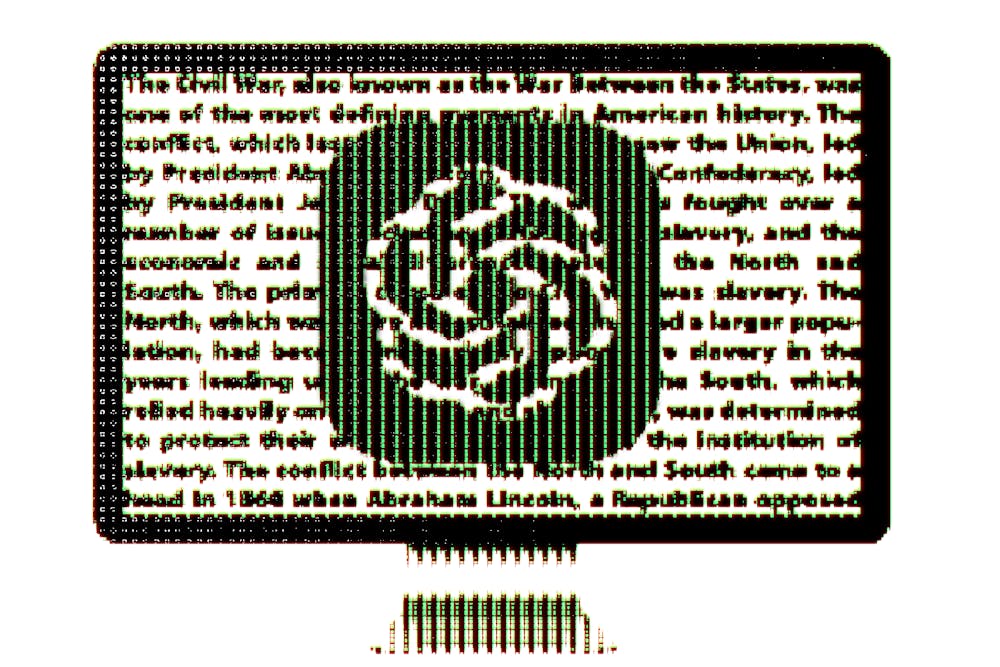Lena said she personally believes using ChatGPT is cheating. In using someone else’s words or the program’s words as an original thought, it falls under the plagiarism category, she said.
The University Honor Code says the following constitute academic dishonesty:
"Plagiarism in the form of deliberate or reckless representation of another’s words, thoughts, or ideas as one’s own without attribution in connection with submission of academic work, whether graded or otherwise.
Cheating, in the form of gaining or attempting to gain an undue advantage on examinations or other academic work, whether graded or otherwise, including but not limited to the following:
a. Using unauthorized materials and methods (notes, books, electronic information, telephonic or other forms of electronic communication, or other sources or methods)"
Because it is up to the professor to authorize the platform, Lena said some people believe it is not necessarily cheating. Instead, they might view it as simply making use of the resources and technology available to them.
Douglas Lauen is a professor in the public policy department. He said he thinks of ChatGPT as an “evolution of search.” He said he believes cheating with online resources like Google or blog posts for academic purposes is the same as using ChatGPT with bad intent, and that it’s the responsibility of the student to discern whether their use of such programs is fair.
“It's up to the user to figure out if that is accurate, useful, a violation of someone's copyright or an unethical use of some information,” Lauen said.
According to Lauen, the best way to make this determination is to know background information about the platform — this includes knowing that ChatGPT is a sophisticated search algorithm, summarized in a natural-sounding shortened language.
“If you don't have that background knowledge, you're going to probably misuse it,” Lauen said. “So, educators are now going to have to figure out how to teach students how to use ChatGPT.”
Other concerns about ChatGPT include its ability to produce in-depth essays, particularly those that could be used in college admissions. Typing in “write a college personal essay” with criteria about your life produces a well-written essay that can be tailored to a specific word count.
“I definitely feel like if someone wanted to use it to write an admissions essay they could, and I think it’ll make its way in slowly,” Lena said.
To get the day's news and headlines in your inbox each morning, sign up for our email newsletters.
Despite the convenience of an automatic essay using ChatGPT, there could be detrimental effects from using these essays in an application.
“That would be a really stupid move on your part,” Lauen said. “ChatGPT is going to give you the blandest and most uninteresting essay anyone has ever read. That essay is not going to help any student get into UNC. They read hundreds of thousands of essays, right? They can tell when they're reading something that is written that doesn't sound like a student.”
The anonymous student who uses the platform for their academics believes it is pointless to use ChatGPT for a personal essay because they think its AI would have a difficult time capturing an individual's personality better than a human can.
“You’re your own person,” they said.
Outside of admissions, the student said ChatGPT as a whole is something many think is a step in the right direction, given that it’s used with the good intention of improving one's knowledge on a given subject.
“I don’t see it as cheating. I see it as taking advantage of the future,” the anonymous student said.
CLARIFICATION: Grace Lena spoke to The Daily Tar Heel in her capacity as a student, not in a way that represents or reflects the opinions of the UNC Honor Court, of which she is a member.
@kaylahallac
university@dailytarheel.com



